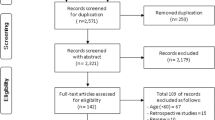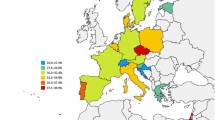Abstract
Background and aims: The hypothesis of increased cardiovascular risk contributing to chronic dizziness has been discussed controversially so far. We investigated older patients suffering from acute (<6 months), chronic (>-6 months) or no dizziness, in terms of their cardiovascular risk and other impairments. Methods: A cross-sectional three-group comparison of 257 patients (65+) presenting at family medicine surgeries in Germany was performed. Measures of cardiovascular risk, including overall scores, scores of quality of life (SF-12), activities of daily living (ADL), depression (GDS), dizziness handicap (DHI) and patients’ needs (DiNA), as well as comorbidity and medication, were compared in univariate and multivariate logistic regression analysis. Results: In univariate analysis, systolic and diastolic blood pressure were significantly lower in the dizziness groups. The overall cardiovascular risk was not increased in dizzy patients. Anxiety was strongly associated with dizziness, whereas other associations were of marginal importance. In multivariate analysis, age (OR 1.10, 95% CI 1.03–1.17), female gender (OR 2.07, 95% CI 1.01–4.26) and anxiety (OR 2.50, 95% CI 1.03–6.05) were associated with acute dizziness, whereas only female gender was significant in chronic dizziness (OR 1.96, 95% CI 1.02–3.75). Comparing all dizzy patients with the non-dizzy group, lower systolic blood pressure was also significantly associated with dizziness. Conclusions: Results from our sample suggest that low systolic blood pressure is more important for dizziness in older patients than increased cardiovascular risk. Acute-onset and long-term dizzy patients were comparable in many aspects, which makes this classification less clinically important.
Similar content being viewed by others
References
Kühlein T, Laux G, Gutscher A, Szecsenyi J. Kontinuierliche Morbiditätsregistrierung in der Hausarztpraxis — vom Beratungsanlass zum Beratungsergebnis. München: Urban & Vogel, 2008.
Colledge NR, Barr-Hamilton RM, Lewis SJ, Sellar RJ, Wilson JA. Evaluation of investigations to diagnose the cause of dizziness in elderly people: a community based controlled study. BMJ 1996; 313: 788–92.
Neuhauser HK, Radtke A, von Brevern M, Lezius F, Feldmann M, Lempert T. Burden of dizziness and vertigo in the community. Arch Intern Med 2008; 168: 2118–24.
Lawson J, Fitzgerald J, Birchall J, Aldren CP, Kenny RA. Diagnosis of geriatric patients with severe dizziness. J Am Geriatr Soc 1999; 47: 12–7.
Katsarkas A. Dizziness in aging: the clinical experience. Geriatrics 2008; 63: 18–20.
Sloane PD, Coeytaux RR, Beck RS, Dallara J. Dizziness: state of the science. Ann Intern Med 2001; 134: 823–32.
Maarsingh OR, Dros J, Schellevis FG, van Weert HC, Bindels PJ, Horst HE. Dizziness reported by elderly patients in family practice: prevalence, incidence, and clinical characteristics. BMC Fam Pract 2010; 11: 2.
Tinetti ME, Williams CS, Gill TM. Dizziness among older adults: a possible geriatric syndrome. Ann Intern Med 2000; 132: 337–44.
Kao AC, Nanda A, Williams CS, Tinetti ME. Validation of dizziness as a possible geriatric syndrome. J Am Geriatr Soc 2001; 49: 72–5.
Colledge NR, Wilson JR, Macintyre CCA, MacLennan WJ. The prevalence and characteristics of dizziness in an elderly community. Age Ageing 1994; 7: 1–8.
Tinetti ME, Williams CS, Gill TM. Health, functional, and psychological outcomes among older persons with chronic dizziness. J Am Geriatr Soc 2000; 48: 417–21.
Grimby A, Rosenhall U. Health-related quality of life and dizziness in old age. Gerontology 1995; 41: 286–98.
Sloane PD. Dizziness in primary care: results from the National Ambulatory Medical Care Survey. J Fam Pract 1989; 29: 33–8.
Gopinath B, McMahon CM, Rochtchina E, Mitchell P. Dizziness and vertigo in an older population: the Blue Mountains prospective cross-sectional study. Clin Otolaryngol 2009; 34: 552–6.
Hsu L-C, Hu H-H, Wong W-J, Wang S-J, Luk Y-O, Chern C-M. Quality of life in elderly patients with dizziness: analysis of the Short-Form Health Survey in 197 patients. Acta Otolaryngol 2005; 125: 55–9.
Kruschinski C, Schweizer S, Hummers-Pradier E, Theile G. “A very broad field”: concepts of general practitioners for dizziness. Z Allg Med 2009; 85: 377–82.
Kruschinski C, Theile G, Dreier S, Hummers-Pradier E. The priorities of elderly dizzy patients suffering from dizziness: a qualitative study. Eur J Gen Pract 2010; 16: 6–11.
Sczepanek J, Wiese B, Hummers-Pradier E, Kruschinski C. Newly diagnosed incident dizziness of older patients: a follow-up study in primary care. BMC Fam Pract 2011; 12: 58.
Drachman DA, Hart CW. An approach to the dizzy patient. Neurology 1972; 22: 323–34.
Ware JE, Kosinski M, Keller SD. A 12-Item Short-Form Health Survey: construction of scales and preliminary tests of reliability and validity. Med Care 1996; 34: 220–33.
Shiekh JI, Yesavage JA. Geriatric Depression Scale (GDS): recent evidence and development of a shorter version. In Brink T (Ed) Clinical Gerontology: A Guide to Assessment and Intervention. New York: Howarth Press, 1986: 165–73.
Fillenbaum GG. Screening the elderly. A brief instrumental activities of daily living measure. J Am Geriatr Soc 1985; 33: 698–706.
Jacobsen GP, Newman CW. The development of the Dizziness Handicap Inventory. Arch Otolaryngol Head Neck Surg 1990; 116: 424–7.
Kruschinski C, Klaassen A, Breull A, Broll A, Hummers-Pradier E. Priorities of elderly dizzy patients in general practice: findings and psychometric properties of the “Dizziness Needs Assessment” (DiNA). Z Gerontol Geriatr 2010; 43: 317–23.
Spitzer RL, Williams, JB, Kroenke K et al. Utility of a new procedure for diagnosing mental disorders in primary care. The PRIME-MD 1000 study. JAMA 1994; 272: 1749–56.
Krones T, Keller H, Sönnichsen A et al. Absolute cardiovascular disease risk and shared decision making in primary care: a randomized controlled trial. Ann Fam Med 2008; 6: 218–27.
Anderson KM, Wilson PW, Odell PM, Kannel WB. An updated coronary risk profile. A statement for health professionals. Circulation 1991; 83: 356–62.
Yardley L, Donovan-Hall M, Smith HE, Walsh BM, Mullee M, Bronstein AM. Effectiveness of primary care-based vestibular rehabilitation for chronic dizziness. Ann Intern Med 2004; 141: 598–605.
Nazareth I. Dizziness. In Jones R, Britten N, Culpepper L et al (Eds) Oxford Textbook of Primary Medical Care. New York: Oxford University Press, 2005: Vol. 2, 1058–63.
Hansson EE, Mansson N-O, Hakansson A. Benign paroxysmal positional vertigo among elderly patients in primary care. Gerontology 2005; 51: 386–9.
Grimley Evans J. Transient neurological dysfunction and risk of stroke in an elderly English population: the different significance of vertigo and non-rotatory dizziness. Age Ageing 1990; 19: 43–9.
Wessely S, Nickson J, Cox B. Symptoms of low blood pressure: a population study. BMJ 1990; 301: 362–5.
Author information
Authors and Affiliations
Corresponding author
Rights and permissions
About this article
Cite this article
Kruschinski, C., Sczepanek, J., Wiese, B. et al. A three-group comparison of acute-onset dizzy, long-term dizzy and non-dizzy older patients in primary care. Aging Clin Exp Res 23, 288–295 (2011). https://doi.org/10.1007/BF03337755
Received:
Accepted:
Published:
Issue Date:
DOI: https://doi.org/10.1007/BF03337755




